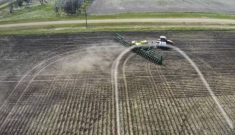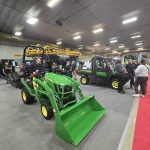I’ve never actually seen a barn-raising. And if the other women in my neighbourhood are holding quilting bees, they’re certainly not inviting me. The olden days are long gone.
Yet farmers are still getting together to share information, news, ideas, and even work. These relationships are generally casual, undocumented, flexible and, well, just downright neighbourly. Informal business relationships disseminate information and insights, they help ease workload in busy times, and they ultimately add extra profit to farmers’ bottom lines.
What I want to know is, can they survive?
Read Also

Lessons from the past: How Canada can reverse its shrinking share of the global food market
A historic look back at how Canada has positively dealt with trade issues — and how those lessons can inform future moves.
Philip Fullerton would clearly say “yes.” Fullerton and his wife and children operate a 6,000-acre grain farm near Lacadena, 100 kilometres northwest of Swift Current, Sask. Fullerton is just past 50, and he’s spent the last 30 years working for, and then with, neighbouring farmers.
In 1975 he started working for my father and uncle. Now he makes occasional arrangements to share labour and machinery with a handful of farmers in the area. “I can think of six combinations of farmers that have worked together over the years,” Philip says. “All within five or six miles of each other.”
One of the farmers Philip has been doing business with in recent years is my cousin, Brock Minogue. Brock in his mid-30s, is farming 3,600 acres near Lacadena with his father. As a young farmer, Brock often goes to Fullerton and other more experienced farmers in the area for advice and opinions about new technology.
When canola was still a new crop in the Lacadena area, Philip had been one of the first to get on board. Soon Brock was ready to plant some as well. But there was a problem. He and his father had traded in their swather to buy a straight-cut header for their combine a few years earlier. He’d need to swath his canola, but he wasn’t ready to seed enough canola to make buying another swather a good economic decision.
There was an easy fix. He just called Philip. “I got him to swath my canola,” Brock recalls. “He has a swather and I don’t.” It was simple.
It was simple for Philip too. “I didn’t have enough acres to fully justify buying a swather that year,” he says. “But I’d leased one anyway, hoping to use it on some of the neighbours’ canola.” In the end, Philip swathed his own canola and Brock’s, and also cut some acres for yet another neighbour, making his leased swather an excellent investment.
When it came time for Brock to repay his debt, another arrangement worked well for both of them. “I would have just paid him,” Brock says, but they found a better way. That fall, Philip’s kids had to leave the farm before the crop was off to get back to their jobs and classes.
Brock’s brother was home at the right time. When they realized that Philip could use some extra manpower, the Minogue brothers filled in. “We took our combine and truck to his place,” Brock says. They didn’t worry about rates or wages or take time to sign contracts, they just went and they weren’t worried. There was complete trust all the way through the relationship.
Brock knows that in lots of cases this type of business arrangement wouldn’t work. “We’re very fortunate in our little neighbourhood. Everybody’s very reasonable. It’s a close-knit community where people treat each other fairly.”
Philip agrees. He’s been trading work back and forth on this sort of basis for years. Generally, especially when it comes to the harvest crunch, Philip and his neighbours worry about the crop first, and discuss the math and accounting later. “At the end of the year we work it out,” Philip says. “I might owe them money, they might owe me money.”
Brock trusted Philip. He wasn’t worried that he might be charged an unfair rate for the swathing. And it didn’t cross his mind that he may not get paid for hours he spent combining Fullerton’s crop. “Philip never underpays,” Brock says. “I suppose we should’ve had a contract,” he admits. “I know for a fact a lawyer would say, ‘that’s great, it’s working, but what about a year when it doesn’t work?’”
Brock is right. The professionals do have a few words of warning.
Tax implications
Rob Stephanson is an accountant and a partner with Cogent Business Consulting in Weyburn, Sask. Many of Stephanson’s clients are farmers and he has seen several versions of this sort of arrangement. “There aren’t really any tax implications,” Stephanson says. “It happens all the time.”
But there can be tax consequences, Stephanson says, “if one person is claiming an expense deduction and the other isn’t claiming the revenue.” A quick discussion among informal partners to make sure everyone is using the same accounting methods could solve this potential problem.
Equipment sharing can also cause tax consequences. If a farmer purchases equipment jointly with a neighbour — even something small — good records can be critical, Stephanson says. “You’re going to want paperwork on who paid for what and when. If the relationship ever breaks down there could be issues from lots of perspectives.”
If the farmers involved in the relationship should have a falling out, or if one of them should die, there may be a dispute over who had claimed depreciation over the years and who ultimately owns the machine.
“If there’s any type of dispute over ownership, you need to be able to prove it. It could even be a dispute over something not related to the farm,” Stephanson says.
Adds Stephanson: “Get the paperwork done ahead of time when everybody’s getting along and excited about the new venture.”
Legal implications
There haven’t been many legal cases involving working relationships like this. Tyler McCuaig, partner with Anderson &Company Barristers and Solicitors says, “This is an area of law where very few things have been decided.”
If you’re involved in a formal partnership with another party you may one day be held liable for their business debts. But McCuaig doesn’t think that’s something Philip and Brock should have to worry about.
“If two neighbours are swapping labour,” McCuaig says, “the law is more likely to characterize it as ‘renting of equipment.’ They won’t actually be seen to be operating together.”
For courts to claim that a farmer is part of a legal partnership, McCuaig says, “you need something more than just using someone else’s equipment.”
You could run the risk of being deemed a formal partnership if you begin purchasing inputs jointly or sharing revenues. This sort of issue is much more likely to come up among family members than among neighbours. Siblings or parents and children working together informally may be determined to be in a legal partnership, making joint decisions. Neighbours involved in a few joint projects are more likely to be judged to be operating independently.
Insurance implications
Insurance may be much more important than either accounting or legal concerns. “If you’re using your equipment on your neighbour’s land and something goes wrong,” McCuaig says, “you may or may not have coverage for that.”
If a swather knife breaks, it’s normal wear and tear. But what about a combine fire? Farmers who take their combines to another farmer’s field should consult with their insurance providers before they take that risk. Nobody wants to stop neighbourly co-operation, but very few farmers can afford to replace a smouldering combine without a cheque from an insurance company.
Advance planning
It might not be technically necessary to draw up an agreement or write down contract terms at the beginning of the year, but it couldn’t hurt, McCuaig says. “These types of operations will carry on for a while, but they inevitably blow up. Eventually the accounting becomes an issue. Someone feels short-changed. There’s no way of fixing it at that point.”
At the very least, a discussion about rates to be charged, accounting procedures and insurance coverage should take place before the work is underway and everyone’s too busy to sit down and consider the implications of working together. Accountant Rob Stephanson agrees. “The problem is that you have to have that discussion sooner rather than later. There’s no reason to procrastinate.”
Philip and Brock are comfortable working with each other and realize they’re lucky. In all these years of working with his neighbours, Philip can’t remember a time when he’s had a problem or came away unhappy. He does remember a time when he thinks he may have let down one of the neighbours. The minor incident weighs on his mind, and he’s likely to find a way to make it up one day. “The last thing I want to do is cheat someone,” he says. “You’ve got to have some trust in the guy who’s working with you.”
In the case of Fullerton, Minogue and the other local farmers who cooperate together on an as-needed basis, it helps that they have similar standards of machinery maintenance, agronomics, and record-keeping. And, perhaps just as important, they have a shared history. “Some of these families go back 100 years,” Philip says. “I worked for Brock’s dad in the ’70s. Now I’m working with the next generation.”CG














